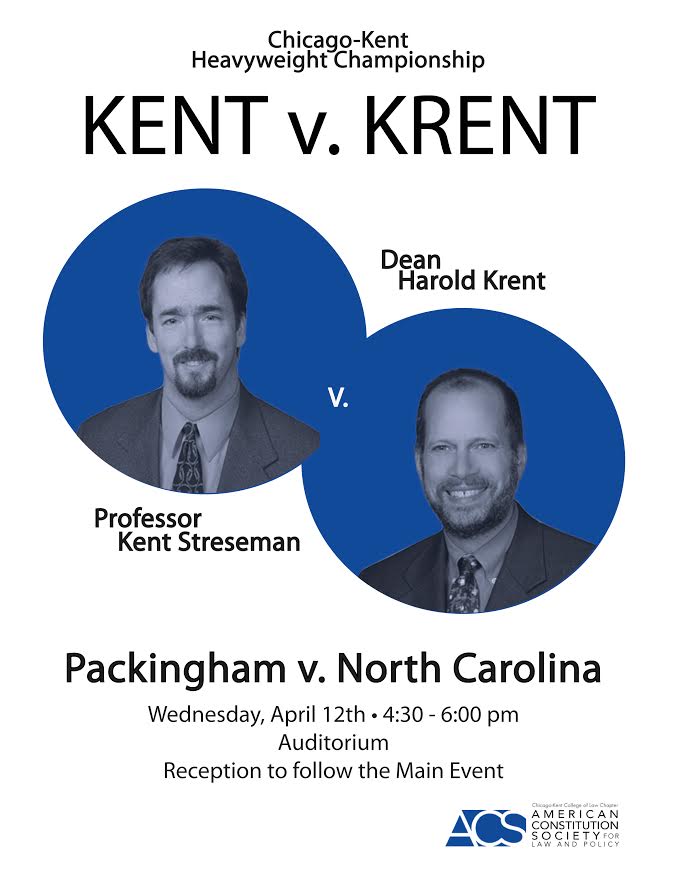KENT vs. KRENT IV

Date: Apr 12, 2017 to Apr 12, 2017
Timing: 4:30 PM to 6:30 PM
Speakers : Professor Steven J. Heyman, Dean Harold Krent, Professor Kent Streseman
Venue : The Governor Richard B. Ogilvie Auditorium
Event Details
Kent vs. Krent IV – Chicago-Kent Heavyweight Championship
Wednesday April 12, 2017, 4:30 PM
Chicago-Kent College of Law
Governor Richard B. Ogilvie Auditorium
Reception with Pizza, Beer, and Wine to follow
The Advocates:
Dean Harold Krent (arguing for Petitioner, Lester Packingham)
Professor Kent Streseman (arguing for Respondent, North Carolina)
The Chief Justice:
Daaron Kimmel, Office of the State Appellate Defender
Associate Justices:
Steven Heyman, (Faculty Member, Chicago-Kent College of Law)
Jeffrey Michalik (3L)
Marko Illich (2L)
Jane Sternecky (2L)
Alexandra Strove (2L)
About Kent vs. Krent
Kent vs. Krent has become a proud annual tradition of the American Constitution Society. Each year, just after our 1L students have finished their appellate brief for legal writing class and are beginning to prepare for their Charles Evans Hughes Oral Arguments, we ask Dean Krent and Professor Streseman to present oral arguments on a case that is currently pending before the U.S. Supreme Court.
Our “Supreme Court” is composed of current Chicago-Kent students, faculty, and is led by a prominent figure in the legal field. This year, our Chief Justice is Daaron Kimmel, who works for the Illinois Office of the Appellate Defender. Mr. Kimmel argued for the defendant in People v. Minnis, a challenge in the Illinois Supreme Court to our state’s social media law for registered sex offenders. Mr. Kimmel will be joined on the bench by Chicago-Kent faculty member, Steven Heyman, and current second and third year members of the Chicago-Kent Moot Court Honors Society.
This Year’s Case: Packingham v. North Carolina
This year, Dean Krent and Professor Streseman will be arguing Packingham v. North Carolina. This case raises critically important legal issues concerning the First Amendment and the constitutional legitimacy of a state law restricting access to social media sites by registered sex offenders.
Factual Background and Procedural Posture
In 2002, Lester Packingham was indicted on two counts of statutory rape. He plead guilty to taking indecent liberties with a minor. A Grand Jury in Cabarrus County, North Carolina, sentenced him to 10-12 months imprisonment. The court suspended his incarceration, and he was placed on 24 months of probation. The state required him to register as a sex offender.
In 2010, Packingham posted to the social media website, Facebook, thanking God for being relieved from a parking ticket:
“Man God is Good! How about I got so much favor they dismissed the ticket before court even started? No fine, no court costs, no nothing spent…. Praise be to GOD, WOW! Thanks JESUS!”
Packingham was indicted for violating North Carolina General Statutes Chapter 14, Section 202.5, a state statute barring registered sex offenders from accessing websites that minors may have access to. The trial court convicted him under 202.5, but the North Carolina appellate court reversed the conviction, finding that § 202.5 did violate the First Amendment on its face and as applied to Packingham’s case.
The North Carolina Supreme Court reversed the lower court’s findings. The court found § 202.5 to be content neutral, only regulating conduct and not speech because it restricts “access” to websites. Further, the statute leaves open “ample alternative channels for communication,” containing specific exceptions for sites that provide discrete email, chat room, photo-sharing, and instant messaging services. The court also struck down Packingham’s overbreadth and vagueness challenges, finding that “the statute was drafted carefully to limit its reach by establishing four criteria that must be met before access to a commercial social networking Web site is prohibited.”
Issue Presented
Whether, under the Court’s First Amendment precedents, a law that makes it a felony for any person on the state’s registry of former sex offenders to “access” a wide array of websites – including Facebook, YouTube, and nytimes.com – that enable communication, expression, and the exchange of information among their users, if the site is “know[n]” to allow minors to have accounts, is permissible, both on its face and as applied to petitioner, who was convicted based on a Facebook post in which he celebrated dismissal of a traffic ticket, declaring “God is Good!”